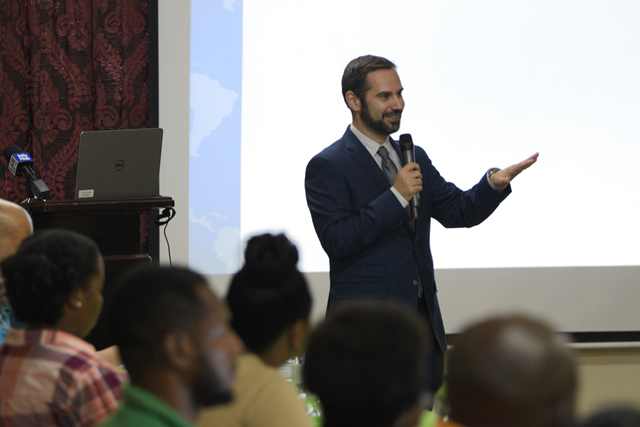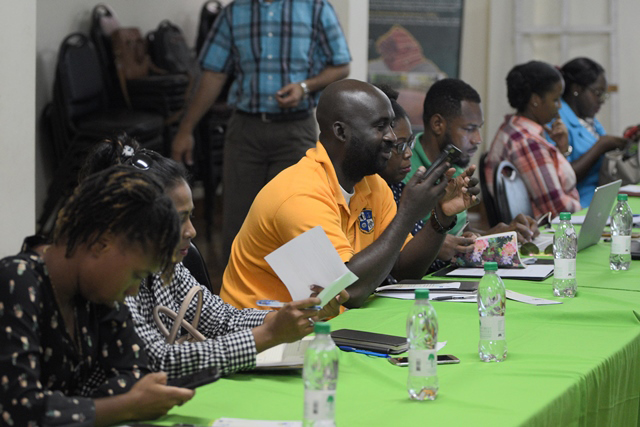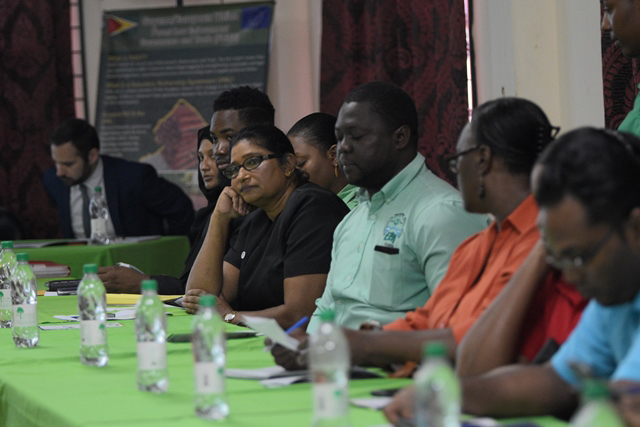Civil servants were on Friday briefed on the country’s obligations under the ground-breaking Escazú Agreement which emphasises environmental human rights and enabling full participation by the public in matters pertaining to the environment.
The agreement which Guyana and other regional countries signed at United Nations Headquarters in New York on 27 September 2018 has binding provisions for States to equip their citizens with information, judicial remedies and spaces for public participation in environmental matters concerning them.
The Department of Public Information (DPI) said that following the signing of the agreement by Guyana and eleven other countries, a seminar was on Friday held to bring awareness of the agreement’s provision for the rights of access to information, public participation and to justice in environmental matters.
The seminar held at the Guyana Forestry Commission was a collaboration between the Department of the Environment of the Ministry of the Presidency and the United Nations’ Economic Commission for Latin America and the Caribbean.
Environmental Affairs Officer of the UN, David Lamarche said that it is vital that persons are aware of the stipulations embedded in the work that they do, according to DPI.
Lamarche said “this seminar aims to create a platform between civil servants so that they raise their awareness of the rights but also so they can know each other and they can work collaboratively and in a coordinated manner. We know the environment requires a collective approach and therefore this is the main aim. So, Guyana and civil servants can know what the rights are, what they need to implement and that the international community, the United Nations Economic Commission for Latin America and the Caribbean is here to support them.”
The stakeholders were also briefed on Principle 10 of the Rio Declaration on Environment and Development and its goal to give everyone a voice on the protection and development of communities. Stakeholder Management Coordinator, Aretha Forde said that the agreement is in keeping with the Government Green State agenda.
“..by enacting this agreement, community members have a stronger and a much louder voice and I say this because the rights of communities and the right of the public to access information and to be consulted in
projects that affect their homes, their lives and their livelihood are already enshrined in some of our acts and regulations; as you know FPIC (Free, Prior and Informed Consent) is one of those processes.”
Countries currently signed on to the agreement are Antigua and Barbuda, Brazil, Costa Rica, the Dominican Republic, Ecuador, Guatemala, Guyana, Haiti, Mexico, Panama, Paraguay, Peru, Saint Lucia, Saint Vincent and the Grenadines and Uruguay.
According to the United Nations Environment Programme (UNEP) website, the Escazú Agreement’s official name is the Regional Agreement on Access to Information, Public Participation and Justice in Environmental Matters.
The agreement is not only the first environmental treaty for the Latin America and Caribbean area, it is also:
* At the forefront of environmental democracy with only one other regional treaty on environmental democracy: Europe’s Aarhus Convention
* The only treaty to have emerged from Rio+20
* The first time a legal agreement includes an Article on environmental human rights defenders.
The UNEP website noted that the Latin America and Caribbean region is home to numerous multifaceted conflicts involving communities opposing business and government interest that threaten their environment, livelihoods and ancestral lands. Global Witness, it said, reports that Latin America and the Caribbean have consistently the highest number of murders of environmental defenders in the world.
The Escazú Agreement’s objective is to settle these problems following Principle 10 of the Rio Declaration: rights of access to environmental information, public participation in the environmental decision-making process and access to justice in environmental matters.
The Regional Agreement was adopted on 4 March 2018 in Escazú, Costa Rica by 24 nations and almost two thirds of them have already signed the treaty.
According to UNEP, negotiations for the Treaty began in 2012. UN Environment supported the process starting in 2013, with the UN Economic Commission for Latin America and the Caribbean, including through developing a number of resource materials and interventions.








